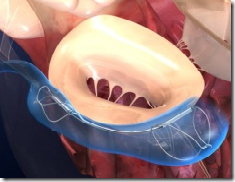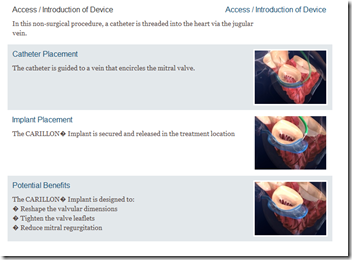The procedure takes an hour and is in trials at present. It is minimally invasive or non-surgical procedure called Percutaneous Mitral Annuloplasty and results are immediate, with less strain on the heart, patients are able to function more freely again without running out of energy. ![]()
“The implant is designed to be positioned, adjusted, and gently anchored in the coronary sinus/great cardiac vein to reshape the annulus around the mitral valve to reduce mitral regurgitation.”
So far just a few more than 50 people have been implanted with the device and it appears to offer some real help to those over 65. Hopefully there will be more on this device soon. There are some pretty big investors here to include Johnson and Johnson. BD
Currently there are two surgical treatment options for functional mitral regurgitation: mitral annuloplasty and mitral valve replacement. When successful, these surgical alternatives deliver excellent chronic efficacy and improved long term outcomes. Unfortunately, these cardiac surgical procedures have associated morbidity and mortality, and consequently only a small percentage of CHF patients suffering from MR are referred for surgery. The current dominant treatment option for patients with CHF and associated MR is medical management, which fails to address the MR directly.
New Treatment Option
Recent reports have indicated that a non-surgical percutaneous therapy may be helpful for treating FMR in patients with heart failure.
The CARILLON™ Mitral Contour System™ was developed for the treatment of functional mitral regurgitation, a condition frequently associated with heart failure. This groundbreaking therapy consists of an implant and a delivery system that is designed to tighten the valve leaflets and improve mitral regurgitation.
Cardiac Dimensions - Treating Functional Mitral Regurgitation





I am a medical resident on cardiology and I also wrote a few words about mitral regurgitation.
ReplyDelete